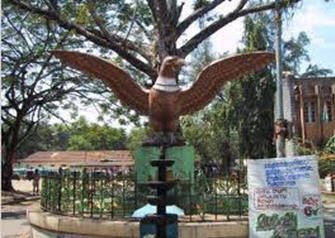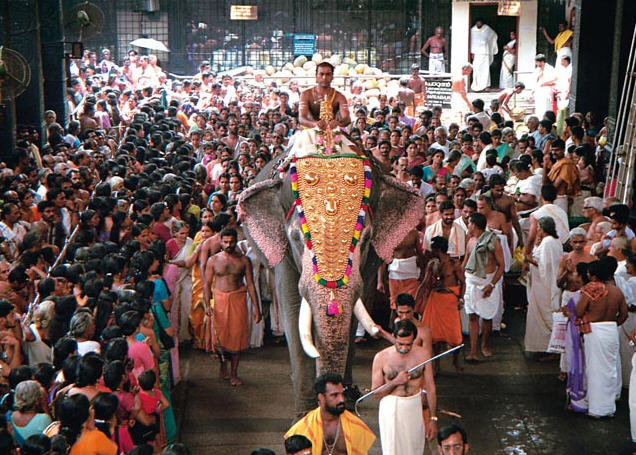Sankaracharya's Forced Halt
Once, Sankaracarya was travelling to Shringeri. While passing through Guruvayur, he smiled at the elaborate procession and tried to pass the temple without making obeisance to the Lord. His movement interrupted the procession at the northwest corner. Soon, he He fell unconscious in front of the elephant procession. When he recovered, he saw the Lord in his majesty. Realizing the cause of his fall, Sankaracharya prostrated before the Lord and tried to win the His favor by chanting eight slokas in praise of Govinda, known as Govinda Ashtakam.
Manjulalthara
 Manjula was a virtuous and devout girl belonging to the Variyar caste. Every night, she used to bring garlands for the Lord. One day she was late and the temple was closed. She could only reach the banyan tree from where the elephant race starts during Utsavam or festival. She felt very guilty about it. Poonthanam, a devotee of the Lord who was on his way back from the temple, saw her crying under the banyan tree. He comforted her and said she could place the garland on the stone at the foot of the banyan tree, since the Lord is everywhere. Convinced, she kept the garland there and went home satisfied. Next morning, the Pujari removed all the garlands from the deity, but one garland remained stuck. The Devotees were puzzled but Poonthanam remembered the event of the night before. It was the garland Manjula had placed on the stone at the foot of the banyan tree.
Manjula was a virtuous and devout girl belonging to the Variyar caste. Every night, she used to bring garlands for the Lord. One day she was late and the temple was closed. She could only reach the banyan tree from where the elephant race starts during Utsavam or festival. She felt very guilty about it. Poonthanam, a devotee of the Lord who was on his way back from the temple, saw her crying under the banyan tree. He comforted her and said she could place the garland on the stone at the foot of the banyan tree, since the Lord is everywhere. Convinced, she kept the garland there and went home satisfied. Next morning, the Pujari removed all the garlands from the deity, but one garland remained stuck. The Devotees were puzzled but Poonthanam remembered the event of the night before. It was the garland Manjula had placed on the stone at the foot of the banyan tree.
Poonthanam told the story to everyone and then the garland slipped from the deity. Devotees started chanting the name of the Lord and went to the banyan tree to offer their obeisance. Since then, the banyan tree came to be known as Manjulalthara.
Devotion Of Nenmini Unni
Once, a Nenmini Namboodiri was the priest at Guruvayur temple. There was only one priest those days. Since he had to go out in an emergency, he told his 12-year-old son to offer the bhoga to the Lord and left. At the prescribed time, he offered bhoga (cooked rice) to the Lord and thought the Lord would eat the rice, but the deity did not move. Unni went outside and brought some salted mangoes and curd from the neighborhood in the belief that the Lord likes food this way. He mixed the curd with rice and offered it again. But the deity still did not move. He coaxed and cajoled but the deity was unmoved. At this, he started crying and told the Lord his father would beat him. The Lord could not bear it anymore and suddenly the bhoga disappeared. The boy left the place happily. On seeing the empty plate, Variyar (person designated to take the Prasad) became angry with Unni, but Unni could not understand why. He told Variyar that God ate the rice with curd and salted mangoes. Unni's innocent reply made Variyar furious. On the santhi's (priest’s) arrival, Variyar said the child had eaten the Bhoga himself and that he was concocting a story. Even though Unni stood his ground, his father could not believe it. When he raised his hands to beat him, he heard a celestial voice, "I am the guilty one, Unni is innocent".
The Lord As Assistant Cook
One day, a devotee wanted a feast to be held for the Lord with 100 measures of rice. In Guruvayur the intended offering to the Lord is to be prepared by the two Kizhsanthis (Cook priests). One of the Kizhsanthis was on sick leave. Mallisseri Namboodiri was worried and he spent a sleepless night pondering how to make the next day’s arrangements. He could do nothing other than pray to the Lord chanting His name overnight. The next day, he went to the temple, looked around and was relieved to see that the Kizhsanthi who had been on leave had come back and was preparing the feast. After completion of cooking, the Kizhsanthi went to Rudra-tirtha for a bath but did not return. He was not seen the next day also. Pujari sent a man to enquire about him. To his surprise, he learned that the Kizhsanthi had been bedridden ever since he went on leave. It was unbelievable but Mallisseri understood. It was the Lord himself who came and helped him.
The Lord As Mangattachan (The Ring story)
Poonthanam, a devotee of the Lord used to walk about 100 kilometers to take darshan of Guruvayur every month. Once, he was attacked by some robbers on the way. Sensing danger, he closed his eyes and cried out for the Lord's help. The sweet scent of Vanamala, the garland worn by Sri Krishna, spread all around and he opened his eyes to see Mangattachan (the Minister of the Zamurin Raja) standing before him with his drawn sword drenched in blood. He also saw the bodies of the robbers around him. Relieved, Poonthanam cried out, "Krishna! Krishna! Your lilas are wonderful!” He took the ring off his finger and presented it to Mangattachan for his help.
The same night the main priest of the Guruvayur temple heard a voice in his dream saying, "You will find a ring on the deity, give it to Poonthanam, who will come tomorrow". Sure enough, the priest saw a ring on the deity when he opened the Temple the next day. Shortly after, ,Poonthanam came for darshan and started his prayers. The priest came out and gave Poonthanam the ring and told him what happened. Poonthanam was flabbergasted to see the ring he had presented to Mangattachan the day before. It was Lord Guruvayurappa who had come to rescue of Poonthanam as Mangattachan.
Melpathur Humbled
The Jnanapana (means the song of wisdom) written in simple Malayalam is Poonthanam's greatest work. Melpathur was the most popular Sanskrit scholar of that time. Poonthanam showed the draft of his Jnanapana to Melpathur. Malayalam was not accepted in learned circles those days and Melpathur held Malayalam in contempt as he did not consider it equal to Sanskrit. He refused to see Poonthanam's work and told him blatantly to learn Sanskrit before writing. This hurt Poonthanam. Melpathur was composing Narayaniyam those days. When he came to offer 10 slokas (ten stanzas) before the Lord the next day, he could not utter a single word. A small boy, never seen before, presented himself and pointed out mistakes after mistakes in the slokas composed by Melpathur. After 10 mistakes in 10 slokas, Melpathur realized the divinity of the boy. He fell at the feet of the boy but He disappeared. A celestial voice rang out saying, "Poonthanam's devotion is more pleasing to me than Melpathur’s knowledge in Sanskrit grammar". Melpathur realized his mistake and asked Poonthanam to pardon him. He amended his arrogance by reading the works of Poonthanam.
The Lord's Partiality For Poonthanam
Though Poonthanam and Melpathur were great devotees of Lord Guruvayur, Poonthanam, a great poet, who wrote his verses in the vernacular, was famous for his bhakti where as Melpathur, an erudite scholar and great poet in Sanskrit, was known for his knowledge. The Lord was partial towards Poonthanam. Melpathur used to laugh at Poonthanam's Sanskrit reading and recitation. One day, Poonthanam was wrongly reciting "Padmanabho Maraprabhu", which means “Lord of trees” in Malayalam. Melpathur openly laughed at Poonthanam and corrected him saying, Padmanabha is not Maraprabhu (Lord of trees) but Amaraprabhu (which means Lord of immortals in Sanskrit). Immediately, there was celestial voice from the inner shrine, "I am also Maraprabhu" (Lord of trees). Now there is a statue of "Maraprabhu" in the Srivalsam guest house (at the southern side of the temple), made of clay. It is the biggest clay deity in Asia.
Poonthanam rendition of Bhagavatam attracts Lord Shiva
Once there lived an ardent devotee of Lord Krishna called Poonthaanam. He worshipped Guruvayoorappan (Lord Krishna) with all his heart. People loved him for his beautiful Bhagavatam discourses. There is a temple in North Kerala called Kottiyoor. The presiding deity in the temple is Lord Shiva. The temple was kept open only for a few days in a year. There was no human activity in that place for the rest of the year. Once, Poonthaanam reached the Kottiyoor temple and bathed in the holy water. He worshiped the compassionate Lord Shiva, felt happy and stayed there for a few days. He recited Bhagavatam every day in front of the deity and hundreds of people listened to his sweet discourse on the wonderful pastime in the 10th Canto 60th of Srimad Bhagavatam named, "Lord Krishna Teases Queen Rukmini." The Lord always plays a complete role in all the pastimes. Be as Parthasarathi, a dutiful son, a loving husband or a loyal friend, He plays the role immaculately. The Lord decides to play with a great devotee and His beloved wife Queen Rukmini. He playfully asks Her why She wanted to marry the Lord when She had better choices like king Sisupala, Salva, Jarasandha, etc. Hearing this, Queen Rukmini faints and Lord consoles Her. This is the gist of the chapter. Poonthaanam finished reading this part of the chapter and kept the bookmark at the end of the chapter. Next day, to his surprise, he found the bookmark at the beginning of the same chapter. So Poonthaanam read the same part for the second time. This was repeated for the rest of the days. It was the last day to close the temple for the year. Poonthanam finished the discourse and was returning from the temple with the other devotees, but somehow left the Bhagavatam in the temple. Having walked some distance, he remembered that he forgot to bring the Bhagavatam. He hurried back; crossed the river and reached the entrance to the temple, which was closed. He was all alone.
He could hear somebody reciting the same part of the chapter inside the temple. As he looked through the keyhole, he saw Lord Siva reading from Poonthanam's Bhagavatam. Mother Parvati and other Bhoothaganas were listening, their eyes filled with tears of devotion. Poonthaanam stood there and heard the recitation. In the end, Lord Siva asked Parvatidevi, "Did you like the recitation"? Parvathi replied, "Yes, it was nice, but was not as good as Poonthaanam's". Lord Siva replied, "Yes. That is true. I also like to hear Bhagavatam from Poonthaanam. That is why I placed the bookmark again and again at the beginning of the same topic every day." Hearing this, Poonthaanam, who stood outside was shaken and uttered the holy name of Krishna loudly. When he watched again, Lord Siva and Mother Parvati had disappeared. This pastime clearly explains how all living entities, including the demigods love this great literature.
Bilwamangalam's Visions
Bilwamangalam's devotion and dedication towards the Lord was such that he could have visions of the Lord’s Deity form wherever he went. Whenever he came to Guruvayur for darshan, the Lord granted him vision from the Sanctum-Sanctorum (central shrine). One day he did not get the Lord's vision from there. He went around the temple in search of the Lord. The sound of tinkling of bells from the northern chuttambalam attracted him. He peeped in and saw Unnikrishna dancing there. From that day onwards, this place came to be known as Nritham (Nrithappura or dancing hall).
On another occasion, he could not see the Lord's vision in the central shrine. Later he found the Lord sitting amidst the Marar boys (drummer's boys) and sharing a feast with them, as the Lord was fond of the feast given to the Marar boys. It later became an important offering with the devotees.
A third time, he failed to have the Lord's vision in the central shrine. It was night and the Krishnanattam was being staged in the courtyard. The saint found Him on the stage. Since then, Krishnanattam came to be staged in the northern bahyankana (outer courtyard) instead of the eastern bahyankana. And it begins only when the central shrine is closed after the last pooja at night.


